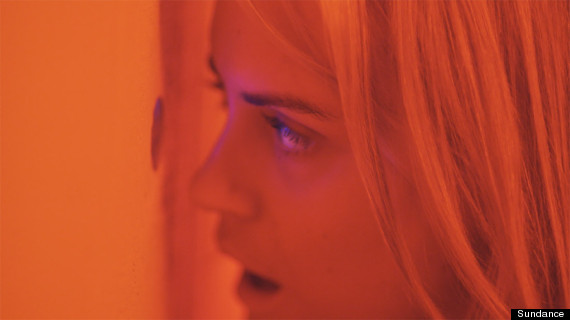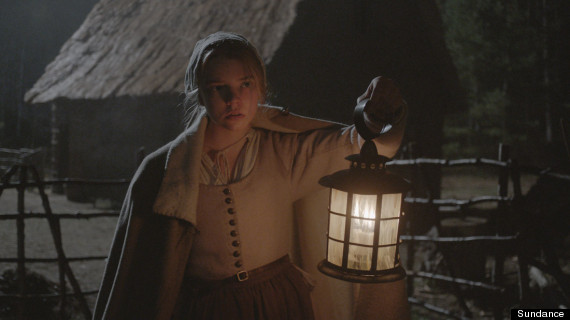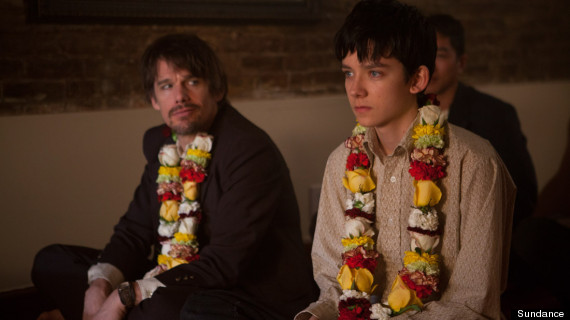Last time on Sundance So Far, we discussed “The Bronze” and other movies that opened the festival. Temperatures dropped to 18 degrees at sundown in Park City, Utah, on Day 2 of Sundance. Parkas were out and crowds were thick at some of the most anticipated films of the opening weekend. The press screening for “Z for Zachariah,” filled up two hours before the film began, and Jason Segel stunned audiences as David Foster Wallace at the world premiere of “The End of the Tour.” We’ll write about both of those films shortly, but here are the other titles HuffPost Entertainment editor Matthew Jacobs and Los Angeles senior editor Sasha Bronner caught on Friday:
“Stockholm, Pennsylvania”
Written and directed by Nikole Beckwith
Starring Saoirse Ronan, Jason Isaacs and Cynthia Nixon
There is more than initially meets the eye in the post-kidnapping drama about a young woman, played by Saoirse Ronan (“The Grand Budapest Hotel”), who is returned to her home after being held captive in a basement for the majority of her life.
Taken from a park when she was 4 years old raised by her kidnapper (played by Jason Isaacs), the extent of what her character knows about the world can be held in the palm of her hand.
The film’s intentional use of claustrophobia does the trick. When Ronan sticks her head out of her bedroom window and, we presume, feels rain for the first time, you too feel her wonder and her innocence.
But this is not an innocent film. Cynthia Nixon, who plays Ronan’s mother, is understandably emotional when her daughter returns home and does her very best to help the family acclimate to their suddenly different circumstances (think “trust falls”). But the people of the town stare. And they discover that their missing daughter doesn’t know when her real birthday is, doesn’t remember them at all and actually thinks that her name is Leia — “named after a Princess,” she tells her parents on her first afternoon home.
The psychological phenomenon Stockholm syndrome describes the common scenario of a captive feeling protective, loving and sympathetic to their captor. Ronan’s character visits the man who took her only once in jail and after telling him that she doesn’t know how to do anything in the real world, she also says she doesn’t know what the worst thing is that’s happened to her — spending her life with him, or spending the rest of it without him.
When she asks if he regrets it, he answers that it takes the same amount of effort to run in place or to run a mile, and he would rather see the mile.
A startling twist (which, of course, we will not ruin for you) turns everything inside out. Filmmaker Nikole Beckwith presents a quiet and powerful debut feature that succeeds in redefining what captivity means as well as tilting the kaleidoscope of identity and love ninety degrees on its side.
Stay tuned: Saoirse Ronan gets more screen time at the festival — she also stars in the 1950s drama “Brooklyn,” written by Nick Hornby, as an Irish-American immigrant attempting to choose between love and her place in the world. — SB
*****
“The Overnight”
Written and directed by Patrick Brice
Starring Taylor Schilling, Adam Scott, Jason Schwartzman and Judith Godrèche

Two delights of Friday’s Sundance came in Patrick Brice’s very funny “The Overnight.” First, Adam Scott and Taylor Schilling, playing a couple looking for friends after moving to Los Angeles, smoke weed with another couple (Jason Schwartzman and Judith Godrèche) who invite them over for what appears to be an innocent playdate for their children. They are a riot as bumbling stoners who conjure up a candidness foreign to their lives as young parents during what turns out to be a quite propulsive gathering. Later, Scott and Schwartzman prance around naked for a solid chunk of the film, for reasons I’d rather you discover on your own. Just know that both actors wear prosthetics, and the size of the genitals on display is an uproarious part of the plot.
“The Overnight” is just bawdy enough to be something of a sex comedy, but it’s nothing if not a tactful tale of a rowdy, confused couple befriending the innocent newcomers from their neighborhood park. The playdate — billed as a simple pizza night at their palatial home — turns into an all-night affair with increasingly bizarre results. There’s a slight dip in the film’s energy toward the end as the dramatic underpinnings of the foursome’s lives unfold, but it doesn’t take away from the sharp performances and clever writing this film boasts. Now where should we mail our smoke-out invitation for Scott and Schilling? — MJ
*****
“The Witch”
Written and directed by Robert Eggers
Starring Anya Taylor-Joy, Kate Dickie, Ralph Ineson, Harvey Scrimshaw, Lucas Dawson and Ellie Grainger

Today’s horror landscape is bleak. The reliance on gratuitous violence and uninventive scare tactics is more of a nightmare than any of the stories being depicted onscreen. Yet every year a few movies break through the gore to channel the worldly panic that horror is meant to showcase. This year, one of those is “The Witch,” a movie that became one of Day 2’s buzziest Sundance titles. (To wit: A24 is nearing a deal to distribute “The Witch.”)
Set in 1630 New England, “The Witch” is a stylish chiller about a devoutly Christian family whose infant vanishes. Their crops fail and they begin accusing one another of occultism — all while a witch creeps through the depths of the woods that surround their home. The movie seems talky at first, but let these irascible colonials work through their muddy family dynamics, from the mother’s grief-stricken instability to the father’s sympathy for her daughter after his wife accuses her of witchcraft. This is eerie filmmaking at its finest, which is all the more remarkable considering Robert Eggers is a first-time director. By the time their paranoia reaches peak levels, this family of six can barely stomach the sight of one another, so wracked with the panic that haunts their countenance. As if Mark Korven’s strings-heavy score weren’t enough eerie enough, know that the film is pieced together using actual journals (including specific conversations) that chronicled the witchcraft that took place in the 17th century. — MJ
*****
“Ten Thousand Saints”
Written and drected by Shari Springer Berman and Robert Pulcini
Starring Ethan Hawke, Asa Butterfield, Hailee Steinfeld, Emile Hirsch and Emily Mortimer

Who doesn’t want to see Ethan Hawke as a burner, weed-selling, dysfunctional father with a heart of gold? Apparently no one, because the premiere of his new film “Ten Thousand Saints” was sold out Friday evening at the Sundance Film Festival. Hawke stars alongside Emily Mortimer, Hailee Steinfeld, Emile Hirsch and
Asa Butterfield, and is the center of an off-kilter family dealing with an actual tragedy and also the general tragedy of growing up.
Set in the 1980s, first in Vermont and then in the East Village in New York City, the film is dripping with teen angst, drugs and rock and roll. Actually, teen angst, weed, cocaine, mushrooms, plenty of huffing and punk rock, to be exact. There are Hare Krishnas, tattoos, protests in New York City and a genre of the hardcore punk scene called “straight edge” where abstinence and sobriety are encouraged.
The teen stars of the film are its strength, carrying their angst like a heavy duffle bag thrown in the corner of every room they enter. But there is a lot packed into the story and there may just be too many protagonists involved for many viewers’ tastes. We probably aren’t supposed to, but in some ways end up rooting the most for Hawke in all his flawed attempts at being a decent father.
Filmmaking duo Shari Springer Berman and Robert Pulcini work as a team writing, directing and editing and are best known for “American Splendor” (2003), “The Nanny Diaries” (2007) and “Cinema Verite” (2011). The two were nominated for an Academy Award in 2003 for their writing of “American Splendor.”
The writing in “Ten Thousand Saints” gives Hawke room to make audiences laugh with his idea of good parenting and one of the most awkward father-son talks we have seen. In a surprisingly poignant moment, he reveals to his son (played by Butterfield) one of his observations about the world and about family: “Women make their decisions and men are just trying not to be men. The whole system needs looking over.”
Young Millenials will flock to the film if they are looking for an indie, hipster coming of age story with plenty of bad decisions and always, of course, the promise of love. — SB







